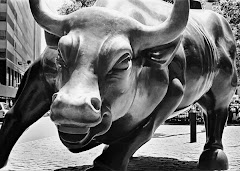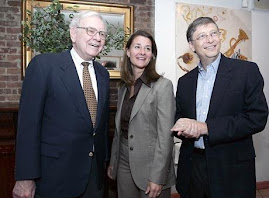I've been talking about economic fundamental over and over again. The broad economic fundamental I'm talking about is the US economic growth. Every investor knows that many country's growth especially Singapore, largely depend on US consumers' demand. This is because Singapore, a country with no natural resources and small population, our growth, measured by the Gross Domestic Products (GDP) depends heavily on our export. And huge portion of our export is to the US and Europe.
Recent years, especially in 2007, there have been many talks about US economic slow down, if not a recession to strike. There have been wide concerns on US trade, budget, exchange, housing, oil prices etc. Others look at the chart (the chartists) and come out of with some statistical analysis which frankly, too deep for me to understand.
Last year, there was a good article published in Singapore's Business Times. I'm particularly interested in the analyst's comment on US economic fundamental (rather than statistical study on Dow). I have reproduced the article below for your reading pleasure. Full credit goes to Business Times.
Business Times - 18 Aug 2006
Dow theorist says US recession in 2007 may be unavoidable
Panic for gold seen as dollar runs into major trouble
(NEW YORK) Richard Russell is feeling like less of a loner these days.
The founder and scribe of the Dow Theory Letters, which examine stockmarket trends, has been warning in recent years that US economic growth would slow far more than anyone could imagine. Many investors and analysts are now coming around to his view, sounding alarm bells about the growing risk of recession in 2007.
Still, Mr Russell differs - again - with the masses. The US economy can hardly avoid such a slump, he said, as it grapples with elevated energy prices and a housing market slowdown in the face of an already indebted consumer.
'We are in for a major recession,' Mr Russell said in an interview. 'I don't think we will get a soft landing in housing. There is just too much debt as far as the consumer goes -and there have been tons of speculators in the housing market.'
The severity of the US housing downturn is being grossly underestimated, he said, and the numbers are unfolding. On Wednesday, the Commerce Department said home construction fell in July to the lowest level in almost two years. Housing starts dropped 2.5 per cent, more than forecast, and building permits declined 6.5 per cent, the most since September 1999.
What's more, the United States faces huge deficits in its budget and current account, which will put pressure on the dollar. So far this year, the greenback's nominal value against a basket of certain major currencies is down 7 per cent.
'No country can keep running up debts and deficits the way we are doing and still be a strong reserve currency,' said Mr Russell. For that reason, 'we are going to have a panic for gold as the dollar runs into major trouble. This country is not addressing the deficits and debt situation at all.'
He sees gold as a 'long-term holding' and forecasts that the metal will ultimately hit US$1,000 an ounce. In early 2004, he advised clients to hold cash and gold, which he called 'as cheap as dirt' at US$400 an ounce. On Wednesday, spot gold traded at US$630.90/631.70 an ounce. Meanwhile, the Dow Jones Industrial Average is locked into a trading range because the market lacks 'any consistent buying', Mr Russell said. Stock indexes need to trade lower 'to the point where the institutional money sees real values, and they are not seeing that right now'.
This year, the Dow has crossed above or below 11,000 about 18 times.
'The market can't get anywhere - and when that happens, you have to get lower prices, where institutional money is willing to come in,' he said.
The Dow hasn't been a complete slouch, though. For the 12 months ended June 30, it has posted a total return of more than 8.5 per cent. But as Mr Russell sees it, the rally in the past 12 months - and, in fact, the gains in the last three-plus years - amount to nothing more than 'an upward correction in a continuing bear market'. Mr Russell's observations may be grislier than others, but they typically command attention. He has done more than anyone to popularise Dow Theory, the analytic system developed in the late 1890s by Charles Dow, founder of The Wall Street Journal, which is published by Dow Jones & Co. The company also owns and maintains the blue-chip Dow average.
Dow Theory aims to identify the primary trends in stock markets, lasting from one to several years, and stipulates that the Dow Jones Transportation Average must 'confirm' a high or low in the Dow industrials for a trend to last.
Even after a rebound in the transports - but not before six weeks of significant declines - Mr Russell said investors aren't falling over stocks for the sheer fact that they now have competition with bonds yielding around 5 per cent. For instance, the S&P 500 is trading at more than 17 times earnings and sporting a dividend yield of less than 2 per cent.
'That is more of a characteristic of a bull market top than a bear market bottom,' Mr Russell said.
US Treasury bills and notes offer twice the yield provided by the S&P 500. That's why many companies are trying to increase their dividends to become more attractive relative to other asset classes, he added.
'The fact is, in 7-1/2 years, the S&P has gone nowhere,' he said. 'When you get a situation like that, people want to get paid for sitting - and they are not getting paid.'
Mr Russell himself is not going to keep still. He advises clients to sit on cash and short-term Treasuries with huge exposure to - surprise - gold. – Reuters
Dow theorist says US recession in 2007 may be unavoidable
Panic for gold seen as dollar runs into major trouble
(NEW YORK) Richard Russell is feeling like less of a loner these days.
The founder and scribe of the Dow Theory Letters, which examine stockmarket trends, has been warning in recent years that US economic growth would slow far more than anyone could imagine. Many investors and analysts are now coming around to his view, sounding alarm bells about the growing risk of recession in 2007.
Still, Mr Russell differs - again - with the masses. The US economy can hardly avoid such a slump, he said, as it grapples with elevated energy prices and a housing market slowdown in the face of an already indebted consumer.
'We are in for a major recession,' Mr Russell said in an interview. 'I don't think we will get a soft landing in housing. There is just too much debt as far as the consumer goes -and there have been tons of speculators in the housing market.'
The severity of the US housing downturn is being grossly underestimated, he said, and the numbers are unfolding. On Wednesday, the Commerce Department said home construction fell in July to the lowest level in almost two years. Housing starts dropped 2.5 per cent, more than forecast, and building permits declined 6.5 per cent, the most since September 1999.
What's more, the United States faces huge deficits in its budget and current account, which will put pressure on the dollar. So far this year, the greenback's nominal value against a basket of certain major currencies is down 7 per cent.
'No country can keep running up debts and deficits the way we are doing and still be a strong reserve currency,' said Mr Russell. For that reason, 'we are going to have a panic for gold as the dollar runs into major trouble. This country is not addressing the deficits and debt situation at all.'
He sees gold as a 'long-term holding' and forecasts that the metal will ultimately hit US$1,000 an ounce. In early 2004, he advised clients to hold cash and gold, which he called 'as cheap as dirt' at US$400 an ounce. On Wednesday, spot gold traded at US$630.90/631.70 an ounce. Meanwhile, the Dow Jones Industrial Average is locked into a trading range because the market lacks 'any consistent buying', Mr Russell said. Stock indexes need to trade lower 'to the point where the institutional money sees real values, and they are not seeing that right now'.
This year, the Dow has crossed above or below 11,000 about 18 times.
'The market can't get anywhere - and when that happens, you have to get lower prices, where institutional money is willing to come in,' he said.
The Dow hasn't been a complete slouch, though. For the 12 months ended June 30, it has posted a total return of more than 8.5 per cent. But as Mr Russell sees it, the rally in the past 12 months - and, in fact, the gains in the last three-plus years - amount to nothing more than 'an upward correction in a continuing bear market'. Mr Russell's observations may be grislier than others, but they typically command attention. He has done more than anyone to popularise Dow Theory, the analytic system developed in the late 1890s by Charles Dow, founder of The Wall Street Journal, which is published by Dow Jones & Co. The company also owns and maintains the blue-chip Dow average.
Dow Theory aims to identify the primary trends in stock markets, lasting from one to several years, and stipulates that the Dow Jones Transportation Average must 'confirm' a high or low in the Dow industrials for a trend to last.
Even after a rebound in the transports - but not before six weeks of significant declines - Mr Russell said investors aren't falling over stocks for the sheer fact that they now have competition with bonds yielding around 5 per cent. For instance, the S&P 500 is trading at more than 17 times earnings and sporting a dividend yield of less than 2 per cent.
'That is more of a characteristic of a bull market top than a bear market bottom,' Mr Russell said.
US Treasury bills and notes offer twice the yield provided by the S&P 500. That's why many companies are trying to increase their dividends to become more attractive relative to other asset classes, he added.
'The fact is, in 7-1/2 years, the S&P has gone nowhere,' he said. 'When you get a situation like that, people want to get paid for sitting - and they are not getting paid.'
Mr Russell himself is not going to keep still. He advises clients to sit on cash and short-term Treasuries with huge exposure to - surprise - gold. – Reuters




No comments:
Post a Comment